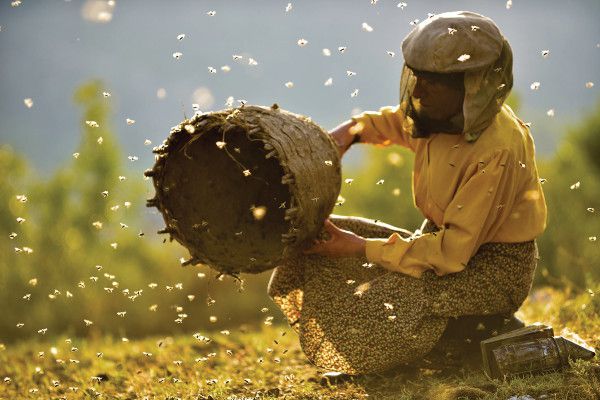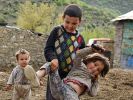Eye For Film >> Movies >> Honeyland (2019) Film Review
Honeyland
Reviewed by: Amber Wilkinson

Bees have long had significance in cultures across the globe - from the Greeks, who believed a baby's lips touched by one would go on to be a great poet, to the mythical messengers of Celtic mythology and the European folkloric tradition that suggested bees must be told about significant events (the inspiration for the title for upcoming film Tell It To The Bees). These sorts of traditions hum through the documentary feature debut Ljubomir Stefanov and Tamara Kotevska, which initially seems to be purely observing the daily work of wild beekeeper Hatidze Muratova - but they are soon married up to unexpected developments that reflect the here and now.
Hatidze lives in a virtually abandoned Macedonian village with her ailing mum Nazife, spending her days walking the countryside to tend her hard-to-reach hives or collecting honey to sell in the town that lies around a half-day's walk away, and her nights chatting with her mum. As a simple slice of life, the film is engrossing and beautifully cinematic from the start, whether Fejmi Daut and Samir Ljuma's cameras are catching Hatidze as a colourful dot against the landscape, performing her various dance-like rituals with the bees or, by candle light, with her Nazife in their tiny home. The directors are quiet, patient and observational, letting life unfold at its own face, without adding voice-over embellishment. This allows us an insight into the bickering as well as the care between the two women - a veritable double-act when it comes to their evening back and forths.

As a character study then, it would be a winner, but the three-year shoot morphs into something altogether different with the arrival of itinerant Turkish couple Hussein and Ljutvie, their herd of cattle and their brood of boisterous offspring. Parking their caravan in the village, they bring with them a noise and chaos that shatters the balanced peace normally enjoyed by Haditze. It could - and might well become in the fullness of time - the plot of a fiction feature, but because this is real life, things don't unfold as you might expect. Despite the differences between Hussein's family and Hatidze, they nevertheless find common ground - at least initially - with Hatidze striking up a relationship with the children who, as captured here, are learning life from the school of hard knocks.
Although Hatidze tries to help Hussein start up some hives of his own, tensions begin to show, as economic pressures are brought to bear on the patriarch that make him consider taking more honey from the bees than is healthy for them. Daut and Ljuma watch events unfold with an intimate but cool eye - this is sometimes a tough watch, not least when the children are getting royally stung by the bees or when one of them looks as though she might drown by accident. They should be commended for the rapport they must have created with all concerned as even the smallest of the children seem oblivious of the camera. They let the humanism shine out without resorting to sentimentality, capturing moments of joy, such as the pleasure of shared, sticky honey, with the same lack of artifice as moments of pain or grief.
Where a fiction feature might take sides, the documentary view allows for considerably more ambivalence about the situation. Hussein might seem from one angle to be a villain driven by greed but we soon see he is as much a victim of economics as anything else, even as he is making dreadful decisions. It also serves as a reminder of the growing number of ghost towns in Europe's rural areas, as more and more flock to the cities in search of a better life. The bees, perhaps, still have a thing or two to tell us about working together to build successful communities - and what happens if a balance isn't maintained. A deserving winner of the World Documentary Grand Jury prize at Sundance.
Reviewed on: 02 Apr 2019















